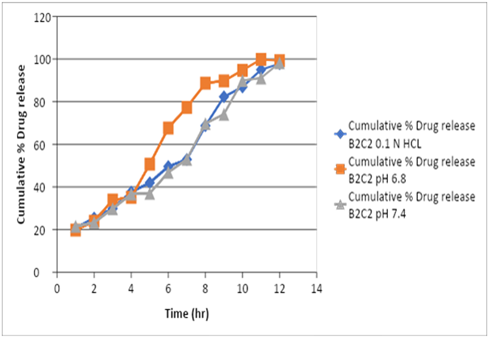Development of Osmotic Drug Delivery System to Control the Release Pattern of Drug Repaglinide
Abstract
The osmotic drug delivery system is a specific type of drug delivery system that regulates the medication release pattern using osmotic pressure. The components of this system include a drug core, a semipermeable membrane, and an osmotic agent. Water is transferred into the osmotic agent across the semipermeable membrane when the drug delivery system is placed in an aqueous environment. This causes the osmotic agent to expand and put pressure on the drug core. This pressure causes the medicine to be released under regulated conditions via a tiny opening in the semipermeable membrane. In comparison to conventional drug delivery methods, the development of osmotic drug delivery systems provides a number of benefits, including increased therapeutic effectiveness, less toxicity, and enhanced patient compliance. The semipermeable membrane's composition, the type and amount of the osmotic agents being employed, as well as the size and number of orifices, may all be changed to easily adjust the rate at which medications are released. In the present work, an osmotic drug delivery system of Repaglinide drug had been developed and characterized with various parameters. This drug delivery system showed potential results to improve drug delivery in the patients.
Full text article
References
A S Bansode and K Sarvanan. Review on novel osmotic drug delivery system. Journal of Drug Delivery and Therapeutics, 8:87–93, 2018.
S Saraf. Applications of novel drug delivery system for herbal formulations. Fitoterapia, 81(7):680–689, 2010.
S K Kushwaha, A Rastogl, A K Rai, and S Singh. Novel drug delivery system for anticancer drug: a review. International Journal of PharmTech Research, 4(2):542–553, 2012.
N M Hemed and N A Melosh. An integrated perspective for the diagnosis and therapy of neurodevelopmental disorders-From an engineering point of view. Advanced Drug Delivery Reviews, 194:114723–114723, 2023.
A Makwana, K Sameja, H Parekh, and Y Pandya. Advancements in controlled release gastroretentive drug delivery system: A review. Journal of Drug Delivery and Therapeutics, 2(3), 2012.
N R Gupta, A Mishal, Y Bhosle, and S Shetty. A review on recent innovation in osmotically controlled drug delivery system. Indian Journal of Pharmaceutical and Biological Research, 2(2):117–117, 2014.
A Sharma, D Kumar, and N Painuly. A review on osmotically controlled drug delivery systems. Asian Journal of Pharmaceutical Research and Development, 6(4):101–109, 2018.
K Praneet, K Narendra Kumar Reddy, and P. Swetha. Simultaneous estimation and method validation of Terbutaline sulfate and Guaifenesin in liquid dosage form by RP-HPLC. Indian Journal of Research in Pharmacy and Biotechnology, 5(1):36–40, 2017.
P Bhateja, R Asija, Y Singh, and M Piplani. An Insight into Osmotic Drug Delivery Systems. Letters in Drug Design & Discovery, 20(1):16– 30, 2023.
M I Mohamed, A M Al-Mahallawi, and S M Awadalla. Development and optimization of osmotically controlled drug delivery system for poorly aqueous soluble diacerein to improve its bioavailability. Drug Development and Industrial Pharmacy, 46(5):814–825, 2020.
H R Mene, N R Mene, D R Parakh, T B Ingale, D R Magar, and M R Mangale. Formulation aspects in the development of controlled porosity osmotic pump tablet. Pharm. Biol. Eval, 3(1):1–18, 2016.
W Q T Tong and H Wen. Preformulation aspects of insoluble compounds. Water-insoluble drug formulation, pages 75–104, 2008.
S K Roy, S Naskar, S Kundu, and K E Koutsu. Formulation and evaluation of sustained release bilayer tablets of propranolol hydrochloride. Int J Pharm Pharm Sci, 7:264– 273, 2015.
Authors
Copyright (c) 2023 International Journal of Research in Pharmaceutical Sciences

This work is licensed under a Creative Commons Attribution-NonCommercial-NoDerivatives 4.0 International License.





